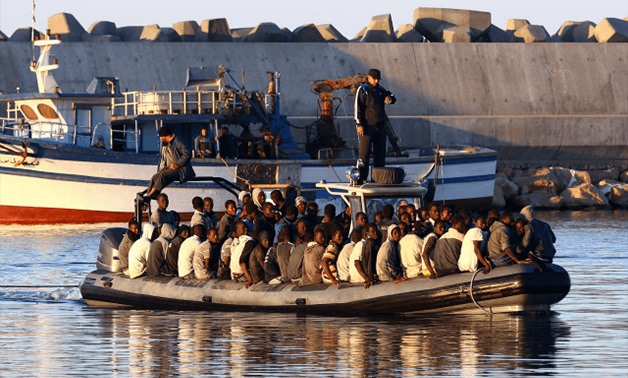
Migrants boat in Libya_Wikimedia Commons
Cairo 10 May:Migrant-related crimes in Libya, including human trafficking, sparked off a debate at the Security Council meeting which is considering the carrying out of an investigation headed by International Criminal Court (ICC) Prosecutor Fatou Bensouda, according to the UN News Centre. The investigations will be underway if the court’s jurisdictional requirements were met.
“My office continues to collect and analyze information relating to serious and widespread crimes allegedly being committed against migrants attempting to transit through Libya. I’m similarly disconcerted by credible reports that Libya has become a marketplace for the trafficking of human beings,” said Bendsouda, according to the UN News Centre.
Bensouda urged all relevant agents, including state and no-state parties, to take effective measures and actions at facilitating the arrest of any involved parties or persons.
The Security Council’s meeting convened on the same day of the Libya’s neighboring countries meeting held in Algeria.
Earlier in April 2017, the International Organization for Migration (IOM) reported concern about the status of migrants from North Africa passing through Libya. IOM staff documented testimonies from violated migrants from Nigeria, Ghana, and Gambia. The testimonies described the existence of “slave markets” in Libya where young African men are being bought and sold.
The UN agency reported that migrants from both sexes were subjected to various forms of violations including beating, electrocution, sexual violence, inhuman conditions of detention, and human trafficking throughout Libya.
The reports also indicated that the current unstable situation in Libya and continuous conflict would stifle the rule of law and would create an environment of human rights abuses and violations of international humanitarian law.
Mohammed Abdiker, IOM’s Director of Operation and Emergencies, said in a press release on IOM’s official page after he had returned from a visit to Tripoli on April 11th: “The situation is dire. The more the IOM engages inside Libya, the more we learn that it is a vale of tears for many migrants. Some reports are truly horrifying and the latest reports of ‘slave markets’ for migrants can be added to a long list of outrages.”
As a response measure, the IOM works to record the suffered migrants’ testimonies. The organization actively spread these testimonies across social media and local radio stations following ethical documentation and publishing standards.
It is worth mentioning that earlier in February 2017 the United Nations Children’s Agency UNICEF published a report titled "A Deadly Journey for Children". In the report’s press release the agency said that a total of 256,000 migrants were recorded in Libya, including 30,803 women and 23,102 children – a third of them were unaccompanied.
“Last year, at least 4,579 people died attempting to cross the Mediterranean from Libya, or 1 in every 40 of those who made the attempt. It is estimated that at least 700 of those who lost their lives were children,’’ a UNICEF press release proclaimed.

Comments
Leave a Comment